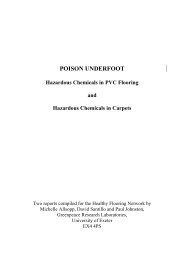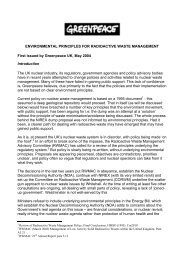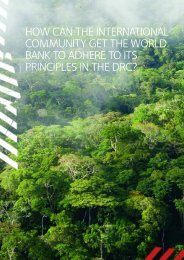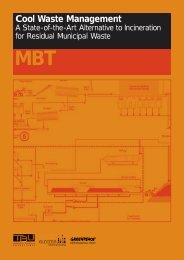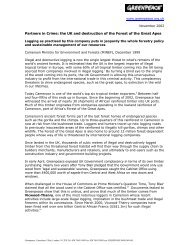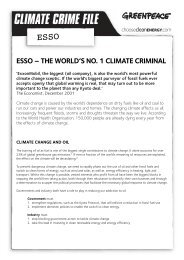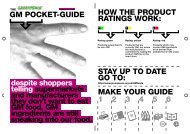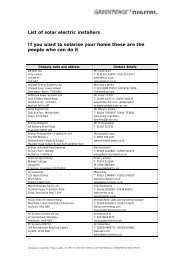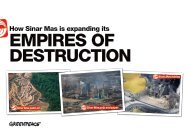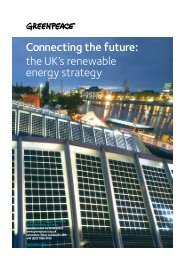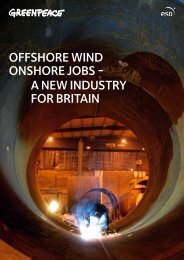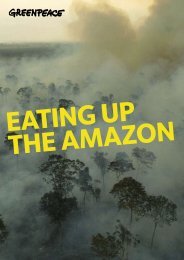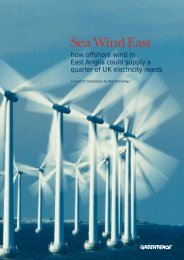How Sinar Mas is Pulping the Planet - Greenpeace
How Sinar Mas is Pulping the Planet - Greenpeace
How Sinar Mas is Pulping the Planet - Greenpeace
Create successful ePaper yourself
Turn your PDF publications into a flip-book with our unique Google optimized e-Paper software.
how sinar mas <strong>is</strong> pulping <strong>the</strong> planet<br />
21<br />
CertIFYING<br />
BAD practice<br />
- controverSY<br />
IN <strong>the</strong> MIX<br />
“Over 2.5 million hectares of peat<br />
land allocated for development <strong>is</strong><br />
believed to be more than three metres<br />
deep, which <strong>is</strong> protected by law.”<br />
Indonesian National Development Planning Agency, 2009 234<br />
Knowing that a growing number of<br />
customers are seeking products<br />
certified as not coming from illegal or<br />
controversial sources, 249 APP has had<br />
a number of its mills’ chains of custody<br />
certified under <strong>the</strong> Programme for <strong>the</strong><br />
Endorsement of Forest Certification<br />
(PEFC) scheme. 250<br />
To bear <strong>the</strong> PEFC logo, a product<br />
must contain 70 per cent minimum<br />
of PEFC-certified virgin fibre, and <strong>the</strong><br />
remaining material in <strong>the</strong> product must<br />
come from ‘verified non-controversial<br />
sources’. <strong>How</strong>ever, as <strong>the</strong>re are no<br />
PEFC-certified forests or plantations<br />
in Indonesia, 251 any production of PEFC<br />
products by APP involves <strong>the</strong> import<br />
of PEFC certified pulp from o<strong>the</strong>r<br />
countries. Th<strong>is</strong> pulp <strong>is</strong> <strong>the</strong>n mixed with<br />
‘verified non-controversial material’ 252<br />
(i.e. non-certified timber) from a number<br />
of concessions in Sumatra. Serious<br />
questions remain as to how any such<br />
timber produced by APP companies can<br />
be classified as ‘non-controversial’.<br />
The company claims that its pulp<br />
mills in Sumatra, PT Indah Kiat and PT<br />
Lontar Papyrus, have introduced: 253<br />
“PEFC procedures for avoidance<br />
of raw material from controversial<br />
sources...verified by an independent<br />
third party certification body in order<br />
to provide confidence that no illegal<br />
or controversial wood enters <strong>the</strong> mills’<br />
fibre supply chain.” (APP Stakeholder<br />
Update, May 2008)<br />
The reality <strong>is</strong> that none of <strong>the</strong> raw<br />
materials entering <strong>the</strong>se mills had been<br />
officially verified under PEFC rules. In<br />
fact, at <strong>the</strong> time that th<strong>is</strong> statement was<br />
written, nei<strong>the</strong>r of <strong>the</strong> mills even had<br />
PEFC Chain of Custody certification. 254<br />
Following correspondence with<br />
<strong>Greenpeace</strong>, PEFC confirmed that<br />
APP has been asked to “modify <strong>the</strong><br />
statement to avoid any potential<br />
m<strong>is</strong>interpretation”. 255<br />
Elsewhere, APP has claimed that <strong>the</strong>se<br />
two mills “have been verified by an<br />
independent third-party certification<br />
body in order to provide confidence<br />
that no illegal or controversial wood<br />
enters <strong>the</strong> mills’ fibre supply chain.”256<br />
(Th<strong>is</strong> text appears above two images of<br />
audit certificates for <strong>the</strong>se mills, <strong>is</strong>sued<br />
by SGS auditors.)<br />
Asked by <strong>Greenpeace</strong> for details of th<strong>is</strong><br />
verification, an SGS auditor replied: 257<br />
“I cannot confirm that SGS has actually<br />
done an audit at <strong>the</strong> mills to confirm that all<br />
material received at <strong>the</strong>se mills <strong>is</strong> covered<br />
by <strong>the</strong> SGS verifications.” (SGS’ emphas<strong>is</strong>)<br />
SGS has more recently confirmed to<br />
<strong>Greenpeace</strong> that no such audit has<br />
taken place. 258<br />
In 2009, according to Min<strong>is</strong>try of Forestry<br />
data, 259 PT Indah Kiat continued to<br />
receive rainforest logs (i.e. MTH). As<br />
shown above, <strong>Greenpeace</strong> investigations<br />
illustrate that <strong>the</strong> company continues to<br />
source rainforest logs from tiger habitat<br />
and peatland forests, both considered<br />
highly controversial.<br />
In addition, acacia logs were supplied<br />
to PT Indah Kiat from plantations that<br />
were establ<strong>is</strong>hed on peat deeper than<br />
three metres, 260 which <strong>is</strong> illegal under<br />
Indonesian law. 261 As of 2006, 213,000<br />
hectares of acacia plantations inside<br />
<strong>Sinar</strong> <strong>Mas</strong>-controlled concessions<br />
were located on peatlands, with at least<br />
50,000 hectares located on peatland<br />
deeper than three metres. 262


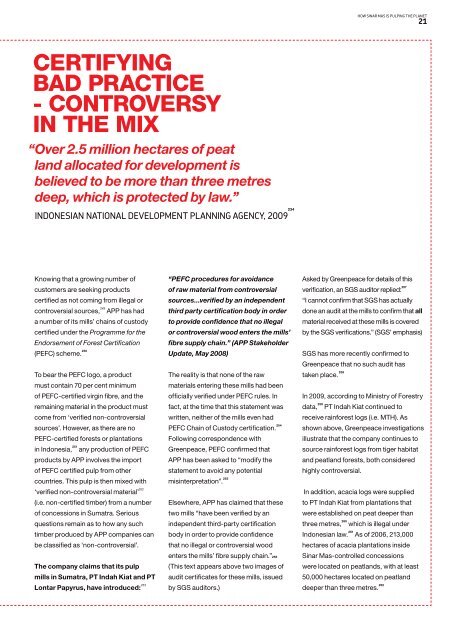
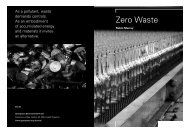
![[2007] EWHC 311 - Greenpeace UK](https://img.yumpu.com/22079793/1/184x260/2007-ewhc-311-greenpeace-uk.jpg?quality=85)
